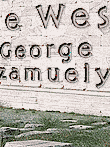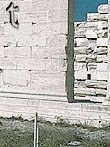 |
 |
 |
 |
 |
 |
 |
 |
 |
 |
October 6, 2000Kostunica: The TricksterWith each passing day, Vojislav Kostunica’s vaunted "independence" looks ever more threadbare. Though Kostunica loudly criticizes US interference in his country’s internal affairs, he acts in accordance with a script written for him in Washington. Before a single vote was counted following the first round of elections, the United States was proclaiming Kostunica the overwhelming victor and demanding Slobodan Milosevic’s resignation. According to the Democratic Opposition’s current figures, Kostunica received 51.34 percent of the vote, and Milosevic 36.22 percent. According to the Yugoslav Federal Election Commission, Kostunica received 48.96 percent of the vote, and Milosevic 38.62 percent. It seems to have escaped almost everyone’s attention that the two sets of figures are really not that far apart. Last week the Opposition was loudly trumpeting the claim that Kostunica had won 54 percent of the vote. The New York Times suggested that it was 55 percent. |
|
|
Anyone who has any doubts as to what the United States intends for Yugoslavia should take a look at the FY 2000 Foreign Operations section of the consolidated appropriation bill (PL 106-113). It says there, sanctions on Yugoslavia will remain in place unless the President "submits to the Committees on Appropriations and Foreign Relations in the Senate and the Committees on Appropriations and International Relations of the House of Representatives a certification" that "the Government of Serbia is fully cooperating with and providing unrestricted access to the International Criminal Tribunal for the former Yugoslavia, including surrendering persons indicted for war crimes who are within the jurisdiction of the territory of Serbia, and with the investigations concerning the commission of war crimes and crimes against humanity in Kosova." Note the tendentious Albanian spelling of Kosovo. Note that sanctions will not be lifted just because Kostunica takes power in Belgrade. He would have to hand over anyone the Hague Tribunal demanded. Furthermore, the Act goes on, President has to certify that "Serbian federal governmental officials and representatives of the ethnic Albanian community in Kosova have agreed on, signed, and begun implementation of a negotiated settlement on the future status of Kosova." Now, since "representatives of the ethnic Albanian community in Kosova" – the KLA, in other words – will not settle on anything short of independence, US sanctions will not be lifted until Serbia agrees to surrender Kosovo to the KLA. The Serbia Democratization Act of 2000 (HR 1064), which has just passed the House of Representatives, raises even more hurdles. There is the issue of the Hungarians of Vojvodina, whose cause the US Government is urged to take up. According to the legislation, the Hungarians of Vojvodina are "subject to continuous harassment, intimidation, and threatening suggestions that they leave the land of their ancestors; and…during the past 10 years this form of ethnic cleansing has already driven 50,000 ethnic Hungarians and members of other minority communities out of the province of Vojvodina." The law calls "on the NATO allies of the United States, during any negotiation on the future status of Kosovo, also to pay substantial attention to establishing satisfactory guarantees for the rights of the people of Vojvodina, and, in particular, of the ethnic minorities in the province." The US Government also intends to pursue the financial claims of the successor states of the former Socialist Republic of Yugoslavia against the current Government of Yugoslavia. The authors of HR 1064 are outraged that from 1992 to 1999 the Government of Yugoslavia had exclusive use in the United States of the diplomatic and consular property of the now defunct Socialist Republic of Yugoslavia. Therefore, "it is the policy of the United States to insist that the Government of Yugoslavia has a responsibility to, and should, actively and cooperatively engage in good faith negotiations with the Governments of Bosnia and Herzegovina, Croatia, the Former Yugoslav Republic of Macedonia, and Slovenia for resolution of the outstanding property issues resulting from the dissolution of the Socialist Federal Republic of Yugoslavia." Thus sanctions will not be lifted until the Serbs are made to fork over a hefty sum of money to States that had seceded from Yugoslavia without engaging in any negotiations whatsoever; that had seized an appropriated property that had belonged to all of the people of Yugoslavia; and had kicked out minorities from their lands without offering them any compensation. Kostunica seems amazingly oblivious to all of this. If ever there was a man not of the hour, it is he. Zoran Djindjic, his campaign manager, revealed the other day that Kostunica is merely a transitory figure as far as the United States and its paid operatives in Yugoslavia are concerned. Kostunica, he explained, "is a necessary bridge" between the politics of the past and a more modern European future. The Serbs, of course, cannot be told of this "modern European future." They have to be tricked into it. Please Support Antiwar.comSend contributions to Antiwar.com or
Contribute Via our Secure Server |
